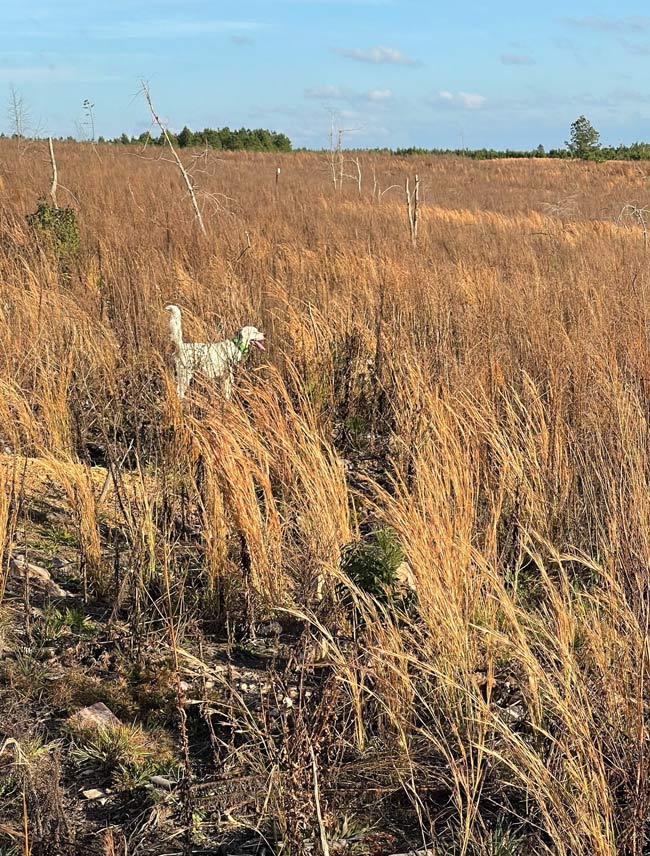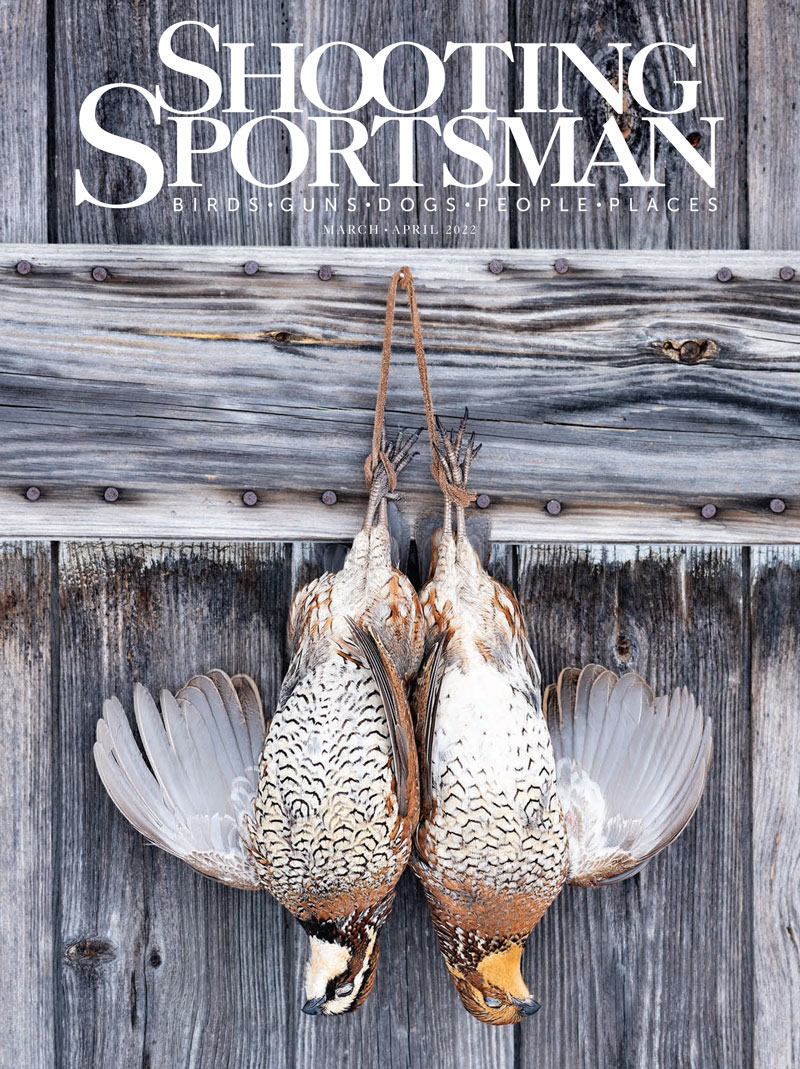Working for—and lucking into—bobwhites on public land
Text and photos by Oliver Hartner
Nature owes us nothing. And those returning to creation and receiving only lessons in humility, patience and perseverance become hunters. The pursuit demands fealty to this process . . . along with faith that some greater good comes from the delayed gratification. So with our only guarantee being gained experience, I rendezvoused with my Louisiana bird hunting buddies Jacob McKnight, James “Buster” Garrison and Robert Parker to hunt bobwhite quail on public land in southeast Oklahoma.
A late-November front froze the morning dew, and I felt grateful for the warmth and shelter of the cozy living quarters inside Jacob’s horse trailer. As daylight displaced darkness, the shadowy figures of dogs and men stirring around camp became discernable. Jacob and Robert loaded their dogs into the idling trucks while Buster and I gathered the day’s provisions. We drove out of camp with no intention of returning until we had moved coveys of quail—or until we had exhausted our daily means to search for them.
Robert and I followed Jacob and Buster as they exited the highway onto a maze of dirt roads. Their truck stirred up a plume of dust while its taillights guided us through the labyrinth like a pair of beacons. Robert trimmed his speed before slowing to a stop, and then dropped his English setter, Katie, while Jacob dropped his setters, Tripp and Radar. The dogs stretched and pranced around the trucks while we grabbed our guns and gear. Buster tucked tobacco into his bottom lip and ambled over with his Remington 1100 balanced across his shoulder saying, “You sure this place is birdy? Looks thick enough to choke a rabbit.”
Jacob replied, “I moved over a dozen coveys here last year, and it thins out after you leave the road. They ought not to have ranged far.” We had little reason to doubt him. Since before he could grow hair on his face, Jacob had been sniffing out quail as well or better than his bird dogs. His ability to find birds was born of innate talent and honed by insatiable desire. Bird hunting coursed through Jacob’s blood and bones, and he needed covey rises like the rest of us need air and water, as if the absence of them would assure his death.
Buster twitched his thick gray handlebar mustache and sniffed loudly before spitting a stream of brown juice into the dirt road. “Let’s get to it then,” he said. Jacob nodded and cast the dogs out front before rolling the dial of his covey counter back to zero and leading us into the woods behind the setters.
Briars and brambles snatched at our clothes and tangled our feet as we pushed through the understory, and as we probed deeper into the cover, the thorny scrub showed no signs of abating. We walked single file, fanning out where we could, and when the brushy curtain allowed fleeting glimpses of the dogs, they appeared as little white blurs running around the forest floor. We pressed farther, but our efforts felt more like a fool’s errand with every step.



Jacob stopped and gave a comeback whistle to the dogs. “This cover is way different than last year,” he said. “I think we need to move on.” None of us could fault him for having tried a piece of proven ground, since bobwhites typically stick close to home. We fought our way back to the road and emerged several hundred yards from the trucks. Jacob and Robert watered the dogs as we weighed our options. With the birds from the previous year having moved out, we now had hundreds of thousands of acres to search, guided only by intuition and unreliable satellite imagery. We drove and scouted along the roads, stopping periodically to whistle and wait for a response, until the setting sun burned like a lantern wick low on fuel.
“I’m thirsty,” Buster said, implying that he wanted for something other than water. Our wounded pride needed a salve, and Jacob knew a place where we could wet our whistles and fill our bellies before returning to camp.
Our second day started before first light. Jacob saw another cover on Google Maps that might hold birds and thought it best that we get underway before sunrise. In the cold blackness before dawn, visible clouds of breath steamed beneath the glow of our head-mounted flashlights as we provisioned for the day, and we left camp welcoming the warmth of our vehicles en route to the dirt-road labyrinth. Jacob followed his hunch to a low-water bridge, which we crossed without incident, and as we climbed the creek bed and crested a hill, the blue light of early morning filtered the colors cast across the landscape. When we stopped at a crossroads, the cold air kissed our faces as we exited the trucks and fanned out along the road to listen for the covey call. Mallards quacked and dabbled several hundred yards away, and had we brought nontoxic shot of sufficient size, they would have been a worthy pursuit.
Jacob whistled at the edge of the road, and three coveys responded from a deep draw a few hundred yards away. “Those two coveys down there are holding in rough cover,” he said, marking their location. “If we were able to get close enough, we’d probably just hear them fly.” Then he gestured to a corner of the cover near the edge of the draw saying, “But pushing this group over here might work.”
Buster said, “They’re gonna stay in that rough cover, since it’s early, and then move out once the ground dries. We could search for other coveys in the meantime and come back.”
At this figurative and literal crossroads, we faced a decision and chose to search elsewhere. But by noon we hadn’t heard or moved anything, so we returned to the crossroads and dropped the dogs. The grade of the ground descended, and the cover grew thicker but remained navigable. Tripp, Radar and Katie ranged ahead, and when Tripp slammed on point, Radar honored him. I spotted splash on the ground just as Jacob raised his over/under and shot a flushing woodcock. Then Katie went on point, and Robert flushed another woodcock, dropping it on his follow-up shot.
“Well, we didn’t get skunked today,” Jacob said, settling the woodcock into his gamebag.
The sun sank behind the trees as we drove back toward the creek, but before we got there Jacob slammed on his brakes, exited his truck and approached Robert’s driver-side window.
“Cut the motor,” he half-whispered. “We just saw a quail cross the road. I’m gonna drop Tripp while y’all gather your gear.” Robert and I got out of the truck and grabbed our vests and guns. Within 40 yards of the road, Tripp locked on point, and we crept into the cover knowing our next step might detonate the covey. They exploded from the ground in unison toward a patch of thorny understory across the draw, and Jacob connected with a bird on the rise while I missed a left-to-right crosser. Tripp retrieved the cockbird and delivered it to Jacob. “I can’t believe we found ’em here as many times as we passed this spot,” Jacob said, rolling the dial of his covey counter to mark one moved. While the last rays of light clung to the horizon, we returned to camp with a few birds in the bag and hope in our hearts for success the following day.
On the third morning, we forded the creek and crested the hill expecting to find at least one covey near the briary understory where they had settled the day before. The dogs ranged out past our marked covey but pointed nothing.
“We’re missing something here,” Jacob said.
“Damn right,” Buster replied, loading his lip with tobacco. “We’re missing quail birds in our bag.” We pressed the area for another hour before returning to the trucks, and though Robert had stuck with us as long as possible, he needed to leave for Nebraska that afternoon for waterfowling in the prairie potholes. “If I leave by noon today, I’ll get where I’m going by 2 am,” he said.
We bid Robert safe travels on his journey before consulting Google Maps like an oracle in which we’d lost faith.
“This is barely any good,” Jacob said. “The cover has changed too much.” As Buster and Jacob discussed our options, I made peace with the possibility of an empty gamebag after half a week of travel and travail. But this was bobwhite quail hunting on public land, and if our investment amounted to nothing more than a quixotic attempt, so be it. In this era, when fewer wild places hold even fewer wild bobwhites, I had been privileged to walk the cover with friends and dogs and guns in search of them. That was the real prize, and it became sufficient.
While en route to try a place Buster had spotted on the map, we passed a public gun range where someone was sighting in a rifle. “Hell,” Jacob said, “let’s just ask this guy if he’s seen any quail.” We turned around and pulled in, and during a muffled conversation outside the truck, I heard, “Yeah . . . walk in
. . . a big orange sign.”
Then, “Thank you so much,” from Jacob as he returned to the truck and waved.
“What’d he say?” Buster asked.
“There’s a fresh burn about twelve miles from here where they thinned it for timber,” Jacob answered. “Fella said he saw quail there while turkey hunting last spring.”
Jacob changed course and followed the cryptic directions to an area we hadn’t touched. After driving around this part of the forest, we spotted singed bark on the pine trees towering above a knee-high carpet of clump grasses. Jacob parked the truck near a sign indicating the area was managed for turkeys.
“This must be it,” he said. “The guy said we’ll need to walk in here toward a creek where he took a gobbler last spring.”
“Let’s whistle before we walk,” Buster skeptically advised.
We spread out along the road to listen, and after marking multiple responses, we moved three coveys during the waning hours of the day—shooting enough birds for supper and leaving the rest for another season.
Back at camp, Buster and I dressed the woodcock and quail, then Jacob broiled them au jus in an aluminum tray filled with spicy beer brine. He cooked the birds over an open flame, adding a garden salad and grilled asparagus spears to our feast, and we kept company into the witching hours while passing a bottle of bourbon around the fire.
Jacob’s bona fides as a quail hunter certainly contributed to our outcome—but with his luck, he could’ve found those birds with a divining rod.
Oliver Hartner is a South Carolina-based writer covering sporting-life interests. His work has appeared in Covey Rise, Quail Forever Journal, USA Today Hunt & Fish and South Carolina Wildlife. He serves on the South Carolina State Committee of Ducks Unlimited as its secretary.
Buy This Issue!
Read our Newsletter
Stay connected to the best of wingshooting & fine guns with additional free content, special offers and promotions.






